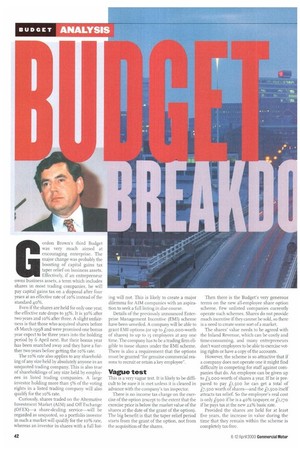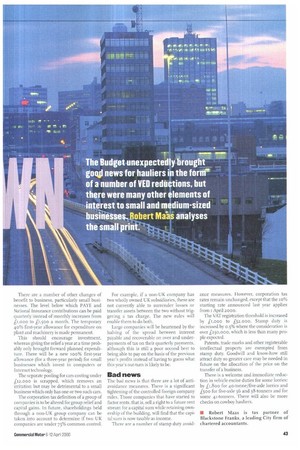G ordon Brown's third Budget was very much aimed at encouraging
Page 44

Page 45

If you've noticed an error in this article please click here to report it so we can fix it.
enterprise. The major change was probably the boosting of capital gains tax taper relief on business assets. Effectively, if an entrepreneur owns business assets, a term which includes shares in most trading companies, he will pay capital gains tax on a disposal after four years at an effective rate of Ia.% instead of the standard 40%.
Even if the shares are held for only one year, the effective rate drops to 35%. It is 30% after two years and ro% after three. A slight unfairness is that those who acquired shares before 18 March i998 and were promised one bonus year expect to be three years into the holding period by 6 April next. But their bonus year has been snatched away and they have a further two years before getting the ro% rate.
The io% rate also applies to any shareholding of any size held by absolutely anyone in an unquote.d trading company. This is also true of shareholdings of any size held by employees in listed trading companies. A large investor holding more than 5% of the voting rights in a listed trading company will also qualify for the ro% rate.
Curiously, shares traded on the Alternative Investment Market (AIM) and Off Exchange (OF EX)—a share-dealing service will be regarded as unquoted, so a portfolio investor in such a market will qualify for the ro% rate, whereas an investor in shares with a full list ing will not. This is likely to create a major dilemma for AIM companies with an aspiration to seek a full listing in due course.
Details of the previously announced Enterprise Management Incentive (EMI) scheme have been unveiled. A company will be able to grant EMI options (or up to boo,000-worth of shares) to up to 15 employees at any one time. The company has to be a trading firm eligible to issue shares under the EMI scheme. There is also a requirement that the options must be granted "for genuine commercial reasons to recruit or retain a key employee".
Vague test
This is a very vague test. it is likely to be difficult to be sure it is met unless it is cleared in advance with the company's tax inspector.
There is no income tax charge on the exercise of the option (except to the extent that the exercise price is below the market value of the shares at the date of the grant of the option). The big benefit is that the taper relief period starts from the grant of the option, not from the acquisition of the shares. Then there is the Budget's very generous terms on the new all-employee share option scheme. Few unlisted companies currently operate such schemes. Shares do not provide much incentive if they cannot be sold, so there is a need to create some sort of a market.
The shares' value needs to be agreed with the Inland Revenue, which can be costly and time-consuming, and many entrepreneurs don't want employees to be able to exercise voting rights or have a copy of the accounts.
However, the scheme is so attractive that if a company does not operate one it might find difficulty in competing for staff against companies that do. An employee can be given up to L3,000.worth of shares a year. If he is prepared to pay 11,5oo he can get a total of i7,5oo worth of shares—and the f1,5oo itself attracts tax relief. So the employee's real cost is only igoo ifhe is a 40% taxpayer, or fr,r7o if he pays tax at the new zz% basic rate.
Provided the shares are held for at least five years, the increase in value during the time that they remain within the scheme is completely tax-free.
There are a number of other changes of benefit to business, particularly small businesses. The level below which PAYE and National Insurance contributions can be paid quarterly instead of monthly increases from LI,000 to LI,500 a month. The temporary 40% first-year allowance For expenditure on plant and machinery is made permanent.
This should encourage investment, whereas giving the relief a year at a time probably only brought forward planned expenditure. There will be a new t00% first-year allowance {for a three-year period) for small businesses which invest in computers or Internet technology, The separate pooling for cars costing under £12,0u00 is scrapped, which removes an irritation but may be detrimental to a small business which only has one or two such cars.
The corporation tax definition of a group of companies is to be altered for group relief and capital gains. In future, shareholdings held through a non-UK group company can be taken into account to determine if two UK companies are under 75% common control, For example, if a non-UK company has two wholly owned UK subsidiaries, these are not currently able to surrender losses or transfer assets between the two without triggering a tax charge. The new rules will enable them to do both.
Large companies will be heartened by the halving of the spread between interest payable and recoverable on over and underpayments of tax on their quarterly payments, although this is still a poor second best to being able to pay on the basis of the previous year's profits instead of having to guess what this year's out-turn is likely to be.
Bad news
The bad news is that there are a lot of antiavoidance measures. There is a significant tightening of the controlled Foreign company rules. Those companies that have started to factor rents, that is, sell a right to a Future rent stream for a capital sum while retaining ownership of the building, will find that the capital sum is now taxable as income.
There are a number of stamp duty avoid ance measures. However, corporation tax rates remain unchanged, except that the to% starting rate announced last year applies from' April 2000 The VAT registration threshold is increased by it,ocio to L52.000. Stamp duty is increased by 0.5% where the consideration is over £250,000, which is less than many people expected.
Patents, trade marks and other registerable intellectual property are exempted from stamp duty. Goodwill and know-how still attract duty so greater care may be needed in future on the allocation of the price on the transfer of a business.
There is a welcome and immediate reduction in vehicle excise duties for some lorries: by £1,800 For 4o-tonne/five-axle lorries and Loo for five-axle 36 and 38-tormers and for some 41-tonners, There will also be more checks on cowboy hauliers.
• Robert Maas is tax partner of Blackstone Franks, a leading City firm of chartered accountants.




















































































































